Aug 23, 2023
Teaching prize for diversity-sensitive teaching 2023 awarded to the BQL elementary school team
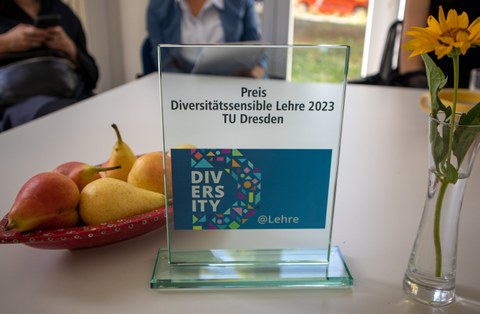
Der Preis für Diversitätssensible Lehre 2023 ging an das Team der Berufsbegleitenden Qualifizierung von Lehrkräften an Grundschulen
Since 2020, teaching concepts have been recognized with the Diversity-Sensitive Teaching Award at TU Dresden. The aim is to highlight the diversity and relevance of diversity-related topics and aspects in the context of teaching. This year, the idea "Hybrid workshop work - an open teaching-learning concept for prospective elementary school teachers(BQL-GS)" was selected for the Teaching Award 2023. The team of the in-service qualification of elementary school teachers was able to implement overarching and inclusive aspects of TU Dresden's 2030 Diversity Strategy in a targeted manner with the regular open workshop learning.
The BQL-GS team, with the support of the BQL.digital team, designed a workshop week in which participants were able to organize their work phases independently, but could also decide just as independently whether they wanted to participate in the events in person or online. All courses were planned both digitally and in person in order to remove as many access barriers as possible. The workshop work that won the teaching award was preceded by a fundamental change in structural framework conditions that consciously integrates and endures the reflexive handling of uncertainty. When planning the workshop concept, the diversity of the starting conditions was already taken into account through joint, deliberately diverse scenarios using differentiation and support services. The workshop team's decision to offer the participants four learning opportunities each, both face-to-face and online, is based on the experience of teaching, in which future teachers are excluded from face-to-face teaching for various health-related reasons, but also on the experience of fathers and mothers from distant regions of Saxony. They are often at a disadvantage because daycare centers or schools open late or close early, or the travel distances are simply too time-consuming.
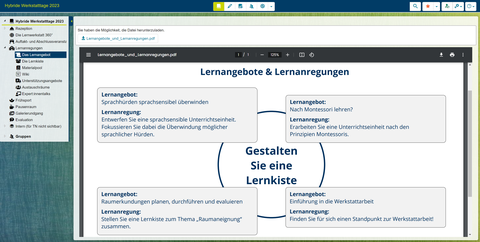
Lernangebote und Lernanregungen für die Teilnehmenden der hybriden Werkstattwoche, in der Lernplattform OPAL
Participants were able to choose suitable learning stimuli for both formats (online/presence). The diverse teaching/learning offers of primary school didactics (e.g. "Overcoming language barriers in a language-sensitive way", "Teaching according to Montessori?", "Planning, carrying out and evaluating spatial explorations") took an interdisciplinary approach.
The aim is to introduce and test workshop learning as problem-solving learning as well as research-based and creative dialog with people and things (Ernst 1990 in Brée 2017). At the end, a learning box with transfer for the school was to be created, which mapped the individual learning path and learning outcomes. By participating in expert talks (lecturers in exchange with participants), a critical and constructive approach to diversity-sensitive offers was also promoted on a content level. Using children's yoga, the sporting component, "teacher and student wellbeing" and thus moving elements could be transferred to the classroom.
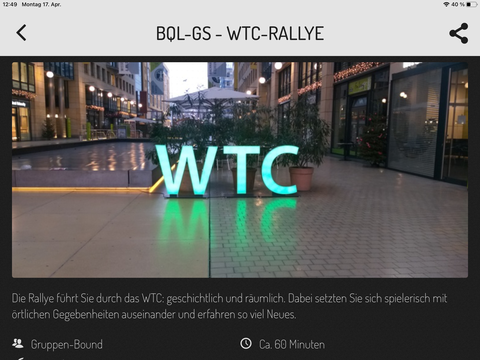
Eine Actionbound-Rallye gab den Teilnehmenden die Möglichkeit, die Räume des WTC spielerisch zu erkunden
A complete transfer of the analog to the digital space was only possible to a limited extent, which is why additive structures and offerings were created in the OPAL course. These included the online reception (corresponding to assisting contact persons in the classroom), which was staffed throughout the course and a point of contact for technical and content-related questions. Furthermore, a virtual 360° tour enabled almost barrier-free orientation in the real physical learning workshop. In the OPAL course, there were differentiated learning stimuli (e.g. deliberately cross-module learning opportunities, a learning box, a material pool, a wiki on important keywords from this year's workshop work, as well as deliberately graduated support offers in the sense of scaffolding).
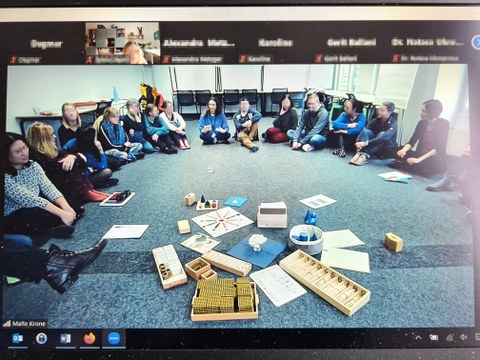
Eindrücke aus dem Lernangebot „Nach Montessori lehren?“, bei dem Teilnehmende sowohl in Präsenz als auch virtuell mitarbeiten konnten
In the classroom, on the other hand, teaching and learning materials were available in haptic form. Virtual and present exchange spaces for collaboration promoted small group work, while references to access to streamed Expert:innentalks offered the opportunity for an in-depth exchange of experiences. A virtual and analog break room and an early morning sports room created an invigorating atmosphere.
At the end, both the physical and virtual learning boxes were presented online via a gallery tour based on task cards. They were subjected to theoretical and practical reflection in further courses. An evaluation of the workshop courses by means of a questionnaire and open discussion rounded off the workshop work and helped to assess the qualitative development.
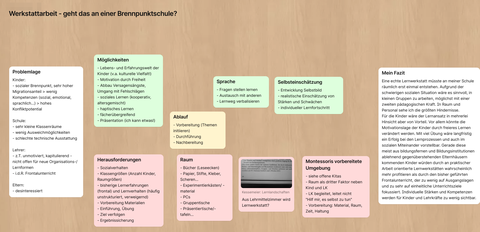
Virtuelle Lernkiste, umgesetzt als Padlet, welche Materialien zur Werkstattarbeit an Brennpunktschulen beinhaltet
Diversity as a permanent cross-sectional task of the school and academic space also leads to a continuation of the workshop learning in the following semesters. The hybrid workshop (as well as the previous digital workshop) was presented on the BQL homepage in order to raise awareness of diversity aspects among a broad public.
Thanks to the award, funding is available for future Diversity-Sensitive Teaching Award projects - a number of such projects are already in the development phase. These include the upcoming Diversity Day for participants from the BQL elementary school department, which is planned for next December. This day will approach the topic in a variety of ways - through inspiring specialist presentations, stimulating discussions and practical references.
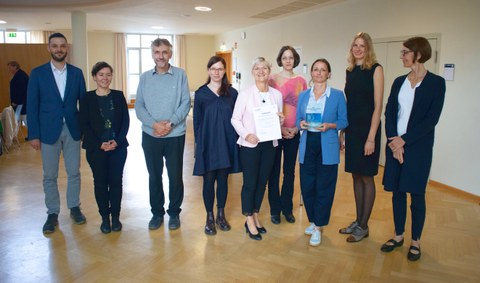
v.l.n.r.: BQL.Digital: Malte Krone, Dagmar Oertel; Prof. Dr. Michael Kobel (Prorektor Bildung); BQL-GS-Team: Dr. Anja Mede-Schelenz, Dr. Peggy Germer, Susan Böttcher, Katharina Weinhold, Lisa Roch; Prof. Dr. Roswitha Böhm (Prorektorin Universitätskultur)
